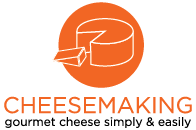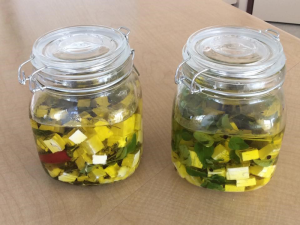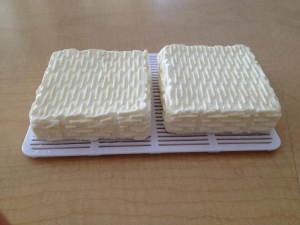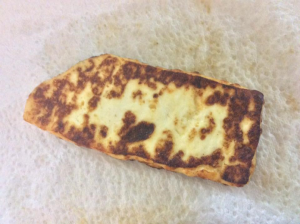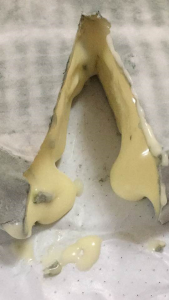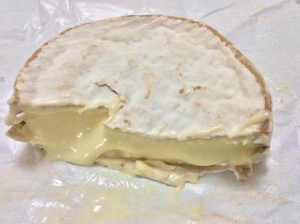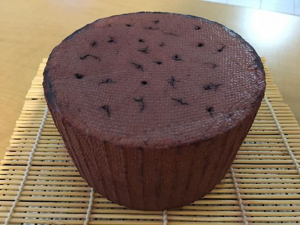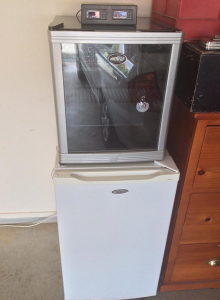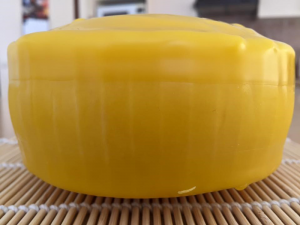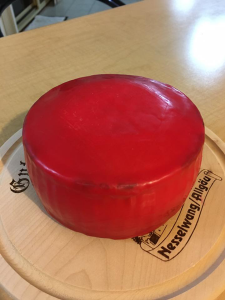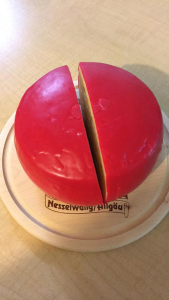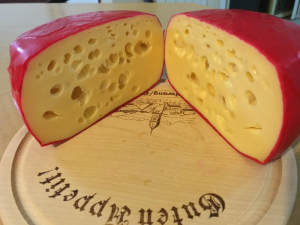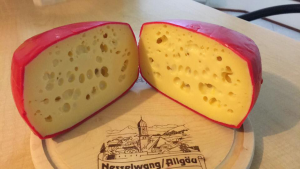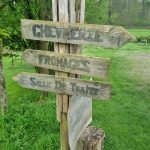When did you take up cheesemaking and why?
My wife and I have always loved cheese! I am pretty adventurous when it comes to cheese and will eat just about anything, my wife however is a little more reserved. She doesn’t like the really stinky and mouldy cheeses (particularly the blues), but loves most others, including Brie & Camembert.
About 4 or 5 years ago, we were walking through Camden Show. There was a stall there that was selling training courses for home cheese making. After I got home from the show, I got to thinking that maybe I didn’t need to do a course. Maybe I could learn what I need to online. Maybe there were kits I could buy to get me started?
A brief search confirmed my suspicions and I began my home cheese making adventures on my own with kits and internet research. The rest is history!
What was the first batch of cheese you made by yourself? How did you feel about the experience and how did the cheese turn out? Can you compare your experience between then and now?
The first batch of cheese I made was Feta. I probably should have started with a more basic cheese, but I was so keen to make something familiar (instead of something boring like Quark), I just jumped right in! The kit I had bought to start me off clearly stated to use unhomogenised milk. I chose to use regular full fat homogenised milk. Suffice to say, the cheese failed dismally. I thought I knew better. I learned my lesson. Follow the recipe exactly. From that day forward, I only use unhomogenised milk in my cheese making.
The second time I tried to make Feta, I used unhomogenised milk. That worked much better. It was a relief to have made a successful cheese after my first failure.
The first few times I made cheese, I was really unsure of myself and was always wondering if I was doing things correctly. Feeling this way is now a thing of the past. The difference between how I was when I started and now is, if you excuse the pun, like chalk and cheese!
What sort of cheese do you make, how many times have you made cheese, why do you like making cheese and how often do you make it?
My main focus is on the bloomy and hard cheeses, with the occasional fresh cheese like Feta and Haloumi. I have successfully made: Feta, Haloumi, Camembert, Double Cream Brie, Gorgonzola, Blue Vein, Stilton, French Neufchâtel, Colby, Cheddar, Caerphilly, Havarti, Wensleydale, Parmesan, Emmentaler (Swiss Cheese), Red Leicester, Cotswold, Edam and Jarlsberg.
I have made cheese more times than I can remember now, but if I were to put a number on it, I would guess at about 50 or 60 times, maybe more!
I like making cheese because I love to eat cheese and I think there is nothing more rewarding than making it yourself. I try and make cheese every opportunity that I get but weekends are really the only time I can make cheese, unless I am on holidays! I also like making cheese because it can be quite relaxing. Some cheese requires stirring the curds & whey for up to 40 minutes. Just standing there, gently moving the curds & whey around the cheese vat is quite relaxing.
Cheese making is a fascinating process. It’s a lost art that is being revived, which I think is fantastic. It’s too easy to go to the supermarket and buy a cheese, it’s something entirely different to make it yourself. I also love to share my cheese with family, friends and work colleagues! My colleagues at work love it when I bring some cheese into the office.
What has been some interesting or rewarding cheesemaking experience/s
This is probably a really boring answer, but for me, there really is no one cheese that is more interesting or rewarding. Every cheese making session is different and has its own rewards. I get a good feeling of accomplishment whenever any cheese turns out. As is often said, cheese making is part magic and part science. You can do the same steps to make a cheese as before and end up with something slightly different. Differences in the milk, the time of the year, the ambient room temperature at the time of cheese making and humidity all play a part in how a cheese turns out. Some of these factors are not necessarily easily controlled. A perfect example is a Petit Bleu I made. It was supposed to be reasonably firm inside, like a Blue Vein, but it ended up gooey inside like a Camembert! But it tasted wonderful!
That said, however, I do really love making and eating my Double Cream Brie. The first Swiss and Jarlsberg I ever made were a thrill and my first Parmesan, though as hard as a rock, tasted incredible!
What has been your biggest cheesemaking challenge
My biggest challenge had to be the hard cheeses. There was a point in time where I seemed to have the knack for the bloomy cheeses, but I couldn’t make a successful hard cheese. Persistence has paid off in that area and I am now making good hard cheeses.
The other challenge I have faced is, believe this or not, I have not been able to make a successful Mozzarella! I’ve tried 3 or 4 times and I just can’t do it! I will have another go at some point in the future, but right now, it’s not my focus. I recently purchased a digital Ph meter. Once I get that, I am going to start using that to measure Ph levels in the milk during the cheese making process to try and achieve a greater level of consistency in my cheese making.
What is your favourite cheese(s) to make?
I really enjoy making Swiss, Jarlsberg, Double Cream Brie and Parmesan.
What cheese do you regularly have in your fridge OR What cheese can’t you do without
We are a big cheese eating family and there is no way I could possibly make enough cheese to satisfy our requirements. We often have sliced cheddar, grated cheddar and parmesan in the fridge from the supermarket. My cheese making just adds to the existing purchased stock. When cheese I have made matures, it is eaten instead of the supermarket stuff.
What is your advice to anyone looking to starting out on a cheesemaking journey?
Don’t give up if you fail! Keep trying! Read the recipe and follow it exactly, do not deviate from it. Not until you better understand the processes involved, then you can start to tweak things
Get involved with groups and forums. I’m involved in a Facebook group called Curds ‘n’ Whey Downunder. Ask questions.
Do a cheese making course, if you can, or reach out to others nearby and see if anyone near you makes cheese. Ask if you can meet up and watch them make cheese and/or help! Watching and learning is a great way to start.
One other piece of advice I can give is that if you are going to seriously get into making cheese, you are going to have to get a cheese fridge. Most cheese matures at temperature ranges from 10°C to 15°C. Most households don’t have anywhere that has a temperature this low or reliably constant, particularly in Australia and during the summer months. To solve this, I got myself a bar fridges and I have rigged up a small mains powered external thermostat controller so I can set the fridge to a temperature that suits my cheese.
The Jarlsberg cheese I made recently turned out so well, Graham asked if I would supply the recipe I used to make it, so here it is! It’s a washed curd cheese, in that you remove a lot of the whey and replace it with fresh water. This reduces the acidity, creating a nice, mild flavour.
A recipe for Jarlesberg is coming soon!
- Marinated feta
- Simple feta
- Haloumi
- Creamy blue vein
- Ripened camembert
- Drunken cow
- Cheese fridges
- Emmenthal
- Jarlsberg
